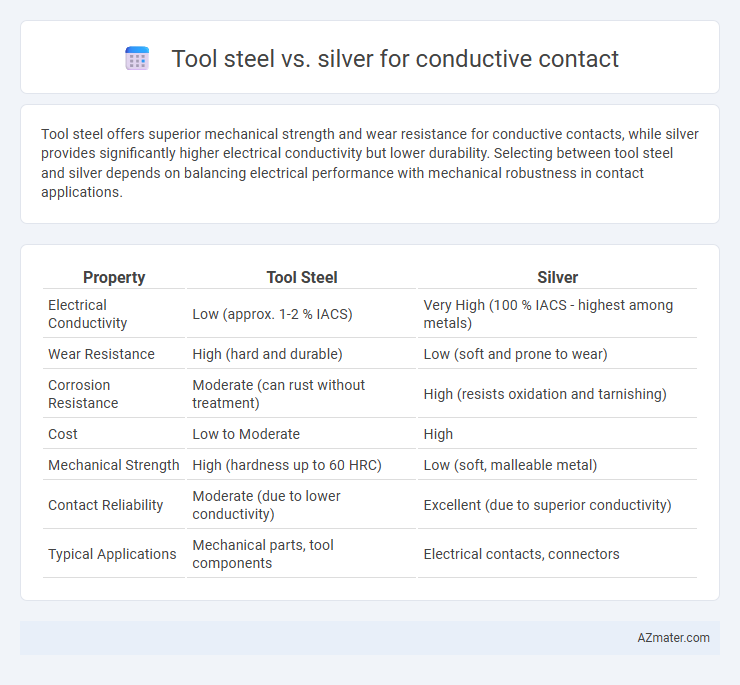Tool steel offers superior mechanical strength and wear resistance for conductive contacts, while silver provides significantly higher electrical conductivity but lower durability. Selecting between tool steel and silver depends on balancing electrical performance with mechanical robustness in contact applications.
Table of Comparison
| Property | Tool Steel | Silver |
|---|---|---|
| Electrical Conductivity | Low (approx. 1-2 % IACS) | Very High (100 % IACS - highest among metals) |
| Wear Resistance | High (hard and durable) | Low (soft and prone to wear) |
| Corrosion Resistance | Moderate (can rust without treatment) | High (resists oxidation and tarnishing) |
| Cost | Low to Moderate | High |
| Mechanical Strength | High (hardness up to 60 HRC) | Low (soft, malleable metal) |
| Contact Reliability | Moderate (due to lower conductivity) | Excellent (due to superior conductivity) |
| Typical Applications | Mechanical parts, tool components | Electrical contacts, connectors |
Introduction to Conductive Contacts
Conductive contacts require materials with excellent electrical conductivity and durability to ensure reliable signal transmission. Silver outperforms tool steel in conductivity, boasting the highest electrical conductivity among metals, making it ideal for low-resistance connections. However, tool steel offers superior mechanical strength and wear resistance, which can be advantageous in high-stress applications despite its lower conductivity.
Overview of Tool Steel and Silver
Tool steel exhibits high hardness, durability, and wear resistance, making it suitable for mechanical components subjected to stress and abrasion. Silver is renowned for its exceptional electrical conductivity and corrosion resistance, ideal for conductive contacts requiring minimal resistance and reliable performance. While tool steel offers mechanical strength, silver provides superior conductivity, often leading to the use of silver coatings on tool steel bases to combine durability with optimal electrical function.
Electrical Conductivity Comparison
Tool steel exhibits significantly lower electrical conductivity compared to silver, with typical values around 1 to 10% IACS (International Annealed Copper Standard), whereas silver boasts the highest conductivity of any metal at approximately 105% IACS. This stark difference makes silver the preferred choice for conductive contacts requiring minimal resistance and superior current flow. However, tool steel's mechanical strength and wear resistance can be advantageous in applications where durability is prioritized over optimal conductivity.
Mechanical Strength and Durability
Tool steel exhibits superior mechanical strength and durability compared to silver, making it ideal for conductive contacts subjected to high mechanical stress and wear. While silver offers excellent electrical conductivity, its softness leads to faster degradation and reduced lifespan under repetitive mechanical load. Therefore, tool steel provides a more reliable and long-lasting solution for conductive contacts requiring robust mechanical performance.
Corrosion Resistance Analysis
Tool steel exhibits superior corrosion resistance compared to silver in conductive contact applications, especially in harsh environments involving moisture and chemicals. Silver's high conductivity is compromised by rapid tarnishing and oxidation, leading to increased contact resistance over time. The durable oxide layer formation on tool steel protects the metal surface, maintaining reliable performance and longevity in corrosive settings.
Cost and Availability
Tool steel offers a cost-effective solution for conductive contacts due to its widespread availability and lower raw material expense compared to silver. Silver provides superior electrical conductivity but comes at a significantly higher price and limited availability because of its market demand and extraction complexities. When balancing budget constraints and resource accessibility, tool steel remains a preferred material for many industrial applications requiring conductive contacts.
Suitability for High-Frequency Applications
Tool steel, known for its hardness and wear resistance, exhibits limited electrical conductivity, making it suboptimal for high-frequency conductive contacts where signal integrity is paramount. Silver's exceptional electrical and thermal conductivity, combined with low contact resistance, enhances performance in high-frequency applications by minimizing signal loss and electromagnetic interference. For conductive contacts in RF and microwave fields, silver outperforms tool steel, ensuring superior conductivity and signal fidelity.
Maintenance and Longevity
Tool steel offers superior durability and resistance to wear compared to silver, making it ideal for conductive contacts subjected to frequent mechanical stress. Silver provides excellent electrical conductivity but is prone to oxidation and surface degradation, which requires regular maintenance to sustain performance. Choosing tool steel reduces maintenance frequency and enhances longevity, especially in high-load industrial applications.
Typical Industry Applications
Tool steel is widely used for conductive contacts in heavy-duty electrical switches and industrial relays due to its high mechanical strength, wear resistance, and moderate conductivity. Silver excels in applications requiring superior electrical conductivity and corrosion resistance, such as precision connectors, high-frequency RF components, and semiconductor manufacturing equipment. Industries including automotive electronics, telecommunications, and aerospace often combine tool steel bases with silver plating to optimize durability and conductivity in harsh environments.
Conclusion: Choosing Between Tool Steel and Silver
Tool steel offers durability and strength ideal for high-wear conductive contacts, while silver excels in conductivity and corrosion resistance, making it preferable for applications requiring minimal electrical resistance. Selecting between tool steel and silver depends on the balance between mechanical robustness and electrical performance parameters, with silver favored in precision electronics and tool steel suited for heavy-duty, long-lasting contacts. Cost considerations also impact the decision, as silver's premium price contrasts with the affordability of tool steel alloys.

Infographic: Tool steel vs Silver for Conductive contact
 azmater.com
azmater.com